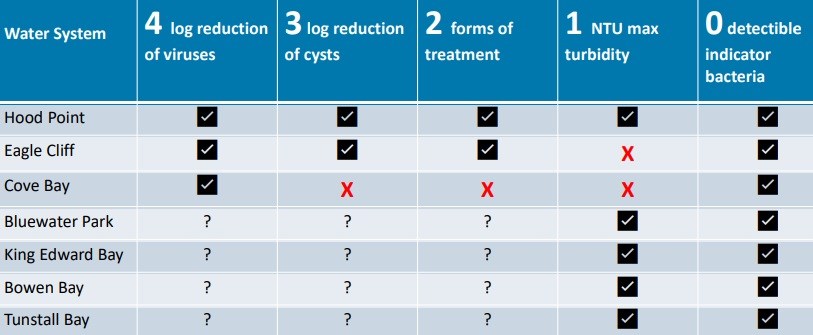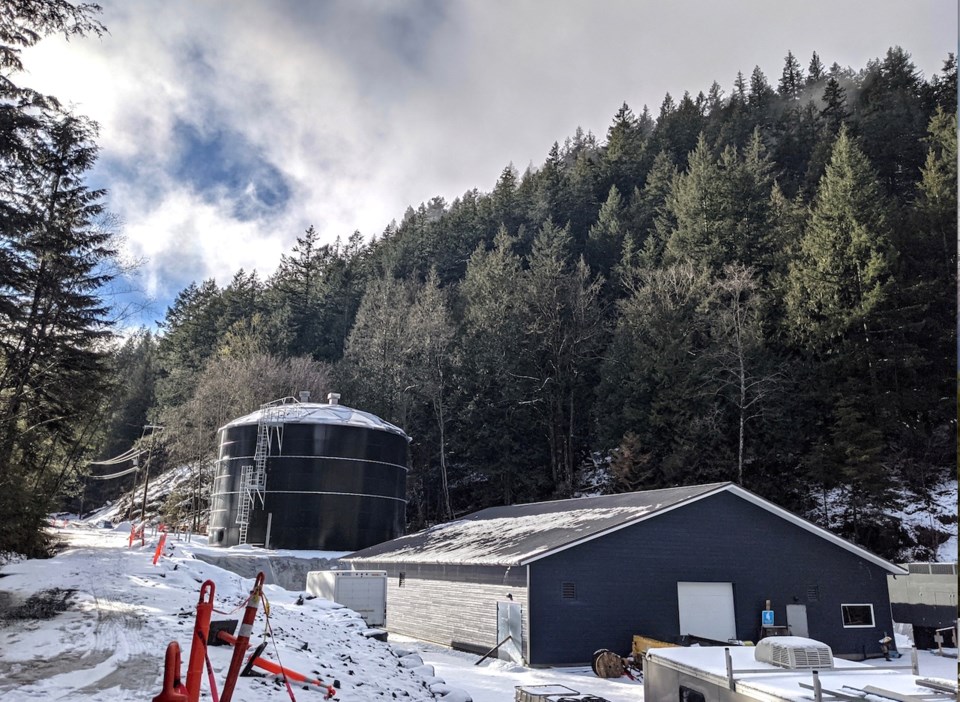Vancouver Coastal Health says it won’t be waiting much longer to take action if Bowen is not able to get its water quality issues under control.
A delegation from the organization (VCH) – which acts as a regulatory body in relation to Bowen’s water systems – gave a presentation to council this week on the current state of water quality around the island. While they noted many of Bowen’s seven systems were doing well, especially those on the west side, serious concerns were expressed about others, particularly the largest one on the island.
The Cove Bay system, which serves more than 650 properties, is failing several of VCH’s treatment objectives, including reduction of cysts, turbidity (cloudiness) levels, and forms of treatment. Because of this the Grafton Lake-sourced water remains under a long-standing drinking water advisory for anybody with compromised immune systems.
Dr. Alex Choi, medical health officer with VCH, said the issues with the Cove Bay system are serious, and the main focus of the delegation’s visit. “That’s why we’re coming here today, because we are expecting that if we continue to have further delays we are going to need to take action… Given what we’re seeing with Cove Bay, we are seeing some treatment objectives not being met,” said Choi.
The water system’s problems are not without a solution – the Cove Bay Water Treatment Plant is expected to clear up all of the current deficiencies. But, it’s now nearing three years since the plant was supposed to come online due to a continued list of technical and engineering delays. VCH acknowledged the work of council and staff and expressed encouragement at the idea of the plant finally being commissioned.
“Many of these concerns would have been ameliorated or eliminated with the new filtration plant that was supposed to go into Cove Bay,” says Choi. But she added VCH cannot take much more time to address the water quality. “To be honest this is not a six-months out thing, this is something that we’re going to be talking to staff about right now.”

Choi outlined three main steps the organization could take to deal with the water issue. One was increased monitoring of the water itself, which would include more frequent and more forms of testing.
More notifications could also be sent out; the medical health officer pointing out that with tourist season on the horizon the upcoming thousands of visitors may not be closely viewing Bowen-based media, such as municipal alerts or the newspaper, which would leave them unaware of the problem. To make sure visitors are informed alerts could be posted around the ferry terminal and in short-term rental spaces on the island.
If turbidity levels continued to rise, the warning could be expanded to include everyone consuming the water, and not just those who are immunocompromised. A final alert step would be a boil water advisory, but Choi said she doesn’t believe that drastic a measure will be necessary anytime soon.
VCH also signs off on permitting on the island, and added this process could come into play as well. “Obviously this is an island where we’ve seen a lot of growth. In order to have more connections to the existing system, we may require that you have a completed commission system before those connections would be allowed to occur,” said Choi.
“I know that would have implications for growth and development and that’s why we wanted to come to you early, because those are some of the things that we are considering right now,” she said.
Mayor Andrew Leonard expressed that it was time for a serious conversation about the state of Bowen’s water systems now and into the future, and not just in Cove Bay. He said Monday’s discussion “leaves me with some very significant wonderings about how we got ourselves here, and possibly what might need to change.”
Asking Choi for her thoughts on the matter, she told the mayor that, in addition to population growth, she sees unique challenges on Bowen which aren’t present in many other municipalities.
“It is unusual to have these local area committees and staff needing to have decisions put through them,” she commented on Bowen’s seven local water service areas which provide direction regarding their specific neighbourhoods.
“For a municipality this size, having good infrastructure and saved water does cost money. So it might be a matter of how are we going to rebuild those cupboards so that money is available for ongoing capital investment. Because otherwise it’s possible that we will find ourselves in this situation again,” added Choi.
“All of these water systems – even after the (Cove Bay) plant is commissioned – are going to need ongoing maintenance. And it’s very challenging if that is only taken from the small group of users of that specific system… There are some hurdles here that staff need to overcome in order to make changes when they have to go through individual advisory committees when they may not have the amount of funding they need to make these ongoing capital investments,” concluded Choi.
The one water system which passed all VCH treatment objectives with flying colours was Hood Point on the north of the island.



